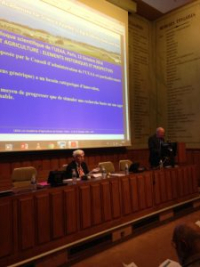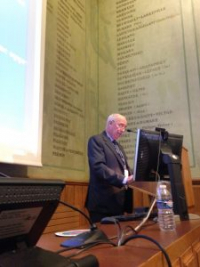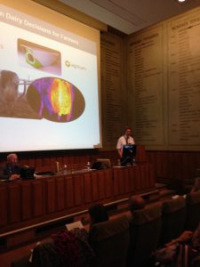
2016, Paris, France, 9th G A, 11 & 12 October 2016
07 11 2016
2016 UEAA COLLOQUIUM, Paris, 11 – 12 October 2016
WELCOME ADDRESS by Professor Michel Thibier
 The Abstract Book of the Colloquium (PDF, 540 kB)
The Abstract Book of the Colloquium (PDF, 540 kB)- Report on the Post conference Tour in the Champagne region (France) – 13 October 2016 – by D E Marchand (Member of the AAF) (DOCX, 540 Kb)
(Also see the slides of all presentations here below, after the welcome address)
Dear Colleagues,
It is my privilege and honor to welcome you all here in Paris for this 2016 UEAA Colloquium and in particular to this very building of the Académie d’Agriculture de France.
The French Academy of Agriculture is a direct descendant of the Agricultural Society of the Generalitat de Paris, which was founded on the 1st of March 1761, by King Louis XV, and after the report of the famous Controleur Général Bertin.
Since its birth in 1761, several famous personalities, among them the most eminent in the field of agronomy (Duhamel de Monceau, Buffon, Lavoisier, Malesherbes, Vilmorin etc…..) have contributed to its high reputation, at first in Europe and later worldwide. It is worth noting that it emerged right in the middle of the “Siècle des Lumières”, at the height of the “Enlightenment”, when it became essential to develop agriculture in European countries, using and improving the techniques available.
The task given to the Academy by the King of France was to create a survey of the agronomic ideas of the time, which could then be discussed at its weekly meetings. The techniques validated through this process were then disseminated, first to his Council, then across the whole country, to promote the modernization of agriculture. Science was already in the “game”, as will be discussed later in this Colloquium.
The UEAA – in English: the Union of European Academies for Science Applied to Agriculture, Food and Nature is not quite as old….
It was founded in Bologna, Italy, in 1999. In October 2000, the first General Assembly (GA), held in Florence, Italy, enacted the union’s bylaws. 14 European academies were members in the beginning, not all of them members of the EU. Italy’s academy held the first presidency, with France as Vice-president. Its ninth General Assembly was held yesterday under the Presidency of France, with the Vice Presidency going back to Italy, 17 years after the birth of the Union.
The 8th G A of the UEAA in Prague proposed the following topic for this 9th GA in Paris:
“Science in Agriculture: historical perspectives and prospective insights”.
This topic was felt to be so relevant to current concerns that the French group proposed to the steering committee that it should hold a Colloquium on its own to allow more time for discussion on this prominent issue: Science and Agriculture”.
The overall idea was to make the claim that:
- Agriculture, as a generic subject including all disciplines under its umbrella (animal production, forestry etc..), needs innovation more than ever, for many reasons, but in particular in relation to the extraordinary increase of the human population on our beloved planet,
- The only way to progress is to stimulate sound science-based research and development,
so as to put “science” in the heart of innovation in Agriculture in our contemporary world.
So how can the Academies of Agriculture or related bodies demonstrate to Society as a whole that there is no alternative to meeting the considerable challenges in:
- Feeding a world population that will soon be 9 billion people,
- respecting the whole environment of humankind
- and ensuring that the people involved in producing food – farmers and breeders, wherever they are in the world – can make a decent living out of doing so.
How can this be done?
A European Union of these Academies is a move in the right direction. “ L’Union fait la force” as our Belgian colleagues say: ‘Unity is Strength’. The fact that they include distinguished scientists and practitioners is also important. But what is really needed now is to communicate more effectively on this critical point: the need to put Science at the heart of innovation in Agriculture.
The Colloquium that we are holding today is one way to testify to the considerable power of sound science to produce progress, and hence to increase the probability of meeting the challenges of the 21st century. “Science in Agriculture: historical perspectives and prospective insights”.
This Colloquium was organised by the scientific committee under three headings:
- to establish the intrinsic link between Agriculture and science in the past, at present, and hopefully, but certainly necessarily, in the future
- to report on the various disciplines involved in this very necessary process of innovation: agronomy, animal breeding, forestry, ecology, sociology, economics etc..
- and to show that this intimate link between science and agriculture is a reality, whatever the local climatologic, pedologic etc. . patterns may be, across the whole of Europe, from Scandinavia to the Mediterranean Sea and from the Atlantic Ocean to the Ural Mountains.
- So to translate those ideas into practice, this Colloquium will be divided in three sessions:
- the first will begin with some historical perspectives thanks to our “agrarian historian colleagues”, followed by some current perspectives on the impact of climatic change, and finally to the EU Commission’s plans for research and innovation in the next few years.
- the second session will be devoted to present and future challenges for land and soil management, with some practical applications in one case study, that of Latvia in the Baltic area.
- The third will also include a case study, from Romania, and will then be more oriented to the future, with reference to biotechnology and genomics research for sustainable innovation in agriculture. We shall end with an interesting reflection on the way the younger generation envisages agriculture in the future,
The scientific committee of this Colloquium hopes these sessions will be of the greatest interest, and thanks all attendees for being here today, in this historical lecture room of the Académie d’Agriculture de France.
Thank you
The slides of all presentations
 European Agricultural Societies, 1750-1900: experimenting and disseminating scientific progress, Nadine VIVIER (PDF, 1 MB)
European Agricultural Societies, 1750-1900: experimenting and disseminating scientific progress, Nadine VIVIER (PDF, 1 MB) The impact of agricultural science 1850 – 2016 : from a gentleman’s amusement to the saviour of the world ? Paul BRASSLEY, University of Exeter, UK (PDF, 256 kB)
The impact of agricultural science 1850 – 2016 : from a gentleman’s amusement to the saviour of the world ? Paul BRASSLEY, University of Exeter, UK (PDF, 256 kB) Climate change and Agriculture Giampiero MARACCHI, Academy of Georgofili (PDF, 3 MB)
Climate change and Agriculture Giampiero MARACCHI, Academy of Georgofili (PDF, 3 MB) Coping with the challenges of sustainable agriculture and food security – the contribution of EU research and innovation Marc DUPONCEL, DG Agriculture and Rural Development European Commission (PDF, 4 MB)
Coping with the challenges of sustainable agriculture and food security – the contribution of EU research and innovation Marc DUPONCEL, DG Agriculture and Rural Development European Commission (PDF, 4 MB) Territorial management of natural resources : Challenges for the Anthropocene Denis COUVET (PDF, 815 kB)
Territorial management of natural resources : Challenges for the Anthropocene Denis COUVET (PDF, 815 kB) Providing knowledge toward an improved biota supported soil management, a timely challenge Jean Charles MUNCH, Rainer MATYSSEK (PDF, 6 MB)
Providing knowledge toward an improved biota supported soil management, a timely challenge Jean Charles MUNCH, Rainer MATYSSEK (PDF, 6 MB) Outcomes and benefits of scientific research on development in latvian agriculture Baiba RIVZA (PDF, 6 MB)
Outcomes and benefits of scientific research on development in latvian agriculture Baiba RIVZA (PDF, 6 MB) Biotechnology: solutions for our alimentation Agnès RICROCH, Louis-Marie HOUDEBINE (PDF, 1 MB)
Biotechnology: solutions for our alimentation Agnès RICROCH, Louis-Marie HOUDEBINE (PDF, 1 MB) The impact of the research results on the romanian agriculture Gheorghe SIN, President of the Academy of Agricultural and Forestry Sciences ”Gheorghe Ionescu-Sisesti” (PDF, 6 MB)
The impact of the research results on the romanian agriculture Gheorghe SIN, President of the Academy of Agricultural and Forestry Sciences ”Gheorghe Ionescu-Sisesti” (PDF, 6 MB) Genomics and resilience Jean-Paul RENARD (PDF, 4 MB)
Genomics and resilience Jean-Paul RENARD (PDF, 4 MB) Future agriculture :in the minds of the next generation Lisa SENNERBY FORSSE (PDF, 4 MB)
Future agriculture :in the minds of the next generation Lisa SENNERBY FORSSE (PDF, 4 MB)


